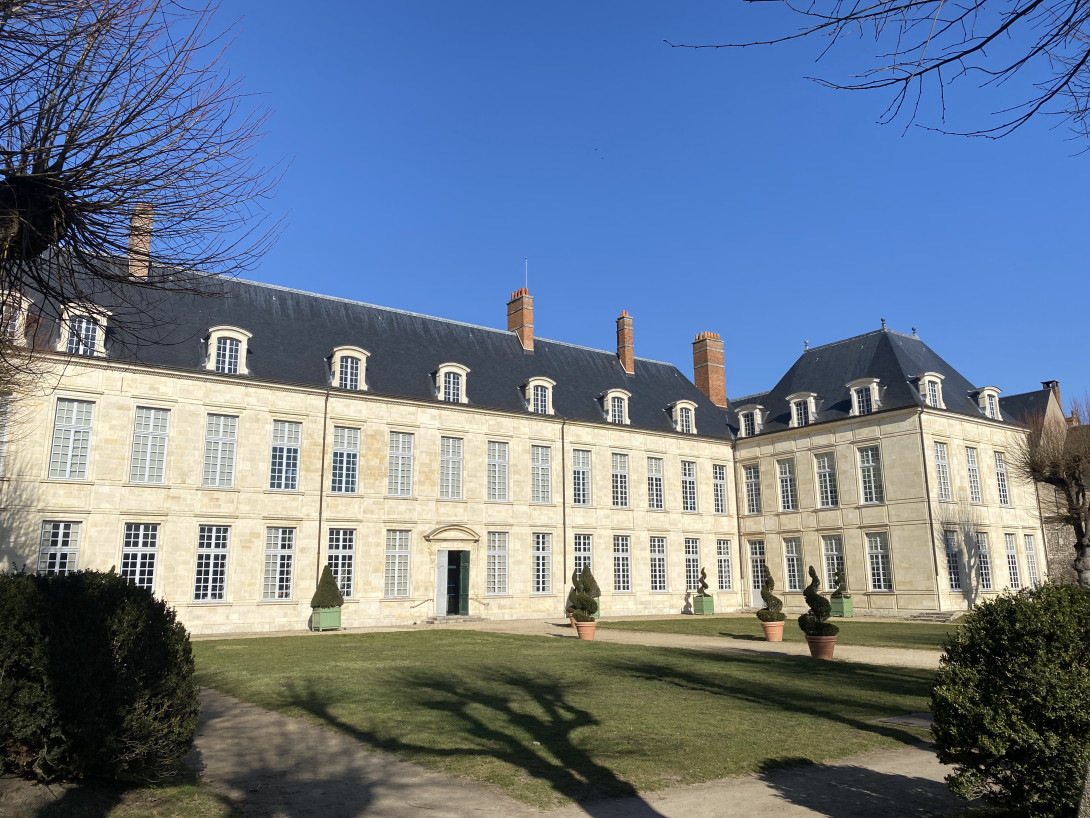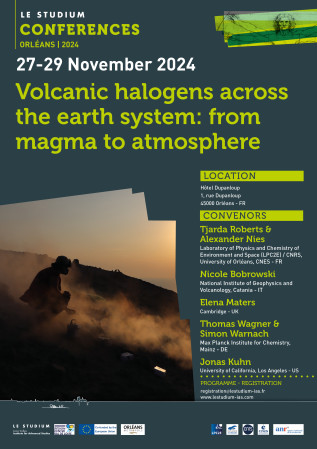Volcanic halogens across the earth system: from magma to atmosphere
Hôtel Dupanloup
1 rue Dupanloup
45000 Orleans
France
Presentation
Halogens play an important role in volcanic systems and their environmental impacts, alongside the main volcanic volatiles (water-vapor, carbon dioxide, and sulfur). Volcanic halogens (fluorine, chlorine, bromine, and iodine) influence the evolution of magmatic systems over time, the transport and fate of metals, and degassing processes leading to passive and eruptive emissions. On entering the atmosphere, halogens in volcanic emission-plumes can undergo chemical reactions that impact atmospheric chemistry, ozone and climate, and exert further influences on the environment and ecosystems by their deposition. Volcanic halogens interact with co-emitted ash particles and can influence the nitrogen, sulfur, and mercury cycles.
Tracing volcanic halogens behavior and fate alongside other volatiles in the volcano-atmosphere-environment system is a complex challenge. Recent advances and newly developed research tools across laboratory experiments, field/observation and model studies are enabling to better quantify and characterize volcanic halogens processes within each of the various earth compartments and to bridge knowledge gaps from the mantle to the atmosphere. When brought together, these advances can collectively inform about the environmental impacts of volcanic halogens, their influence on largescale cycles and their evolution in the earth system (and for other planets), and the potential use of volcanic halogens datasets to contribute to observatory efforts to monitor and predict eruption hazards.
We seek to gather together the earth-science and chemistry-climate communities - from France and Internationally - for a multidisciplinary workshop to share our research on volcanic halogens.
This workshop is sponsored by the LEFE CHAT, LE STUDIUM, the H’allo Volcano International Consortium and the ANR Consortium VOLC-HAL-CLIM.
CONVENORS
- Tjarda Roberts,
Laboratory of Physics and Chemistry of Environment and Space (LPC2E) / CNRS, University of Orléans, CNES - FR - Nicole Bobrowski,
National Institute of Geophysics and Volcanology, Catania - IT - Elena Maters,
Cambridge - UK - Alexander Nies,
Laboratory of Physics and Chemistry of Environment and Space (LPC2E) / CNRS, University of Orléans, CNES - FR - Thomas Wagner,
Max Planck Institute for Chemistry, Mainz - DE - Simon Warnach,
Max Planck Institute for Chemistry, Mainz - DE - Jonas Kuhn,
University of California, Los Angeles - USA
Programme
Wednesday 27th November 2024
- 12:30 Welcome lunch & registration
- 14:00 Official opening - Sophie Gabillet (General secretary of LE STUDIUM), Tjarda Roberts
- 14:30 Magali Bonifacie - Chlorine stable isotope systematics at La Soufrière de Guadeloupe (FWI)
- 15:00 Delphine Contamine - A Geological Record of Atmospheric Nitrogen Fixation During Explosive Eruption: The Case of Tecopa Basin, California
- 15:30 Nathalie Huret -Characterization of the chemical composition of volcanic plume using infrared hyperspectral imagery
- 16:00 Coffee breaks
- 16:30 Posters session
- 19:00 Wine & Cheese cocktail
Thursday 28th November 2024
- 9:30 Kirstin Krüger - Revisiting the 10th-Century Eldgjá Eruption in Iceland: Modeling the Climatic and Environmental Impacts
- 10:00 Lea Ostorero - CO2 budget of Neo-Tethyan magmas from Iran and their potential contribution to the Middle Eocene Climatic Optimum
- 10:30 Helene Balcone-Boissard - Volcanic halogen fluxes towards the atmosphere
- 11:00 coffee break
- 11:30 Richard Thomas - Chlorine in silicate melts: controls on dissolution, bonding, evaporation, and brine exsolution
- 12:00 Monika Rusiecka - Chlorine and NaCl in hydrous basaltic melts
- 12:30 Nicolas Levillayer - Substantial release of halogens from degassing lava fields and impact on metal emissions.
- 13:00 Lunch
- 14:30 Alkuin Koenig - Observed in-plume gaseous elemental mercury depletion may be related to gas-particle interactions
- 15:00 Simon Warnach - Bromine monoxide in volcanic plumes: a global survey derived from TROPOMI satellite
- 15:30 Alexander Nies - A novel model of volcanic plume evolution from high-temperature chemistry to reactive plume chemistry in the atmosphere
- 16:00 Coffee break
- 16:30 Elena Maters - Volcanic ash as a reactive surface for halogen chemistry
- 17:00 Mathieu Colombier - Halogen chemistry in submarine volcanic clouds reaching the stratosphere and related climatic impacts
- 17:30 Hazel Vernier - An Ocean of Stratospheric Aerosols after the Hunga Tonga- Hunga Ha'apai submarine volcanic eruption
- 18:00 Guided visit (Departure in front of the Hotel Dupanloup)
- 19:30 Gala Dinner – Le Lift
Friday 29th November 2024
- 9:30 Sylvie Vergniolle - Insights on degassing and eruptive dynamics at Yasur volcano (Vanuatu) deduced from infrasonic records
- 10:00 Sébastien Payan - Data Terra data and services in support to volcanic related studies.
- 10:30 Special Session TBC, Poster Discussions, Interdisciplinary topic discussions & future developments
- 12:00 Conclusion
Location
Hôtel Dupanloup : 1, rue Dupanloup - 45000 ORLEANS - FR
The conference venue is unique. Located right next to the Orléans’ cathedral, the episcopal palace of Orléans, built between 1635 and 1641, locally known as the Hôtel Dupanloup, is a classical French building which served until 1905 of residence to the bishops of Orléans. Since 2014, the renewed palace hosts the International University Center for Research and Le Studium Loire Valley Institute for Advanced Studies.
Participants will be welcomed in this exceptional surrounding, blending Middle Age and Renaissance cultures with modern design and will have the opportunity to discover French cuisine and wines.
General Information
| Congress Venue |
Hôtel Dupanloup, 1 rue Dupanloup
45000 Orléans, France
| Dates |
Wednesday, 27 November - Friday, 29 November 2024
| Language |
The official language of the Congress is English
| Welcome pack and Name Badge |
Upon arrival you will receive a welcome pack that includes the printed material of the Conference and your name badge will be given to you at the reception . Please wear your name badge at all times during the Conference and to all official Conference events.
| Invitation Letters |
An official letter of invitation facilitating the obtention of an entry visa can be sent upon request . In order to receive an invitation letter for visa purposes, send an email to maurine.villiers@lestudium-ias.fr. Please note that :
- we only issue an official letter once the payment of the registration fee has been validated.
- such letters do not represent a commitment on the part of the Organisers to provide any financial assistance.
| Certificate of attendance |
After the conference, in order to receive a certficate of participation, send an email to maurine.villiers@lestudium-ias.fr
| Hotels |
List of recommended Hotels in Orléans
| Restaurant |
How to get there ?
| By train: |
* Orléans centre station
1.5 hour trip from Paris (Austerlitz)
Tramway A, 10 minutes trip to Orléans centre station
> Plan your trip by train: https://www.sncf-connect.com/en-en/
| By car: |
GPS: 47.90243, 1.91179
Please note that you can't park in the courtyard in front of the Hotel Dupanloup.
Paid car parks nearby :
Parking Cathédrale, Rue Saint-Pierre Lentin, 45000 Orléans
Parking Hôtel de Ville, 4 Rue Fernand Rabier, 45000 Orléans
| By plane: |
Take RER B in direction to Saint Rémy Les Chevreuse, step out at Gare du Nord Stop
Take Metro 5 in direction to Place d'Italie, step out at Gare d'Austerlitz Stop
Take RER C from Pont de Rungis – Aéroport d’Orly in direction to Pontoise.
Step out at Gare d'Austerlitz Stop
Pricing
(Including two lunches, a wine & cheese cocktail and the coffee breaks)
| Public institutions | 100 EUR |
| Students & PhD Scholars | 75 EUR |
| Gala dinner | 60 EUR |
Cancellation Policy
All cancellations must be made in writing and sent by email to the Registration Department
Up to 30 days prior to conference start – Full refund less €50 handling fee
Less than 30 days prior to conference start – No refund
Oral presentations & posters
Abstracts for oral presentation and poster should be submitted before Monday 30th September 2024.
Please upload your abstract during the registration or send it before the deadline to maurine.villiers@lestudium-ias.fr.
The number of oral presentations is limited, convenors will process a selection and confirm your presentation few days later.
Please note that we do not print the posters, but racks & pins will be provided for up to A0 sizes, portrait format.
- Please download the template for oral presentation.
- Please download the template for poster presentation.








